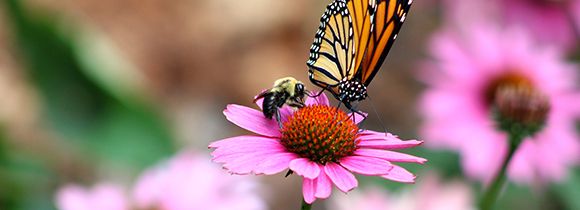Spread the Word! It’s Pollinator Week June 19-25
- Details
- Created: Thursday, 08 June 2017 11:48

Gardeners everywhere appreciate the importance of pollinators. Pollinator Week, June 19-25, brings the importance of pollination to the forefront and to the masses. Most of us remember from grade school what pollination is: it occurs when pollen is moved from flower to flower by the birds and the bees, bats, butterflies and even the wind. We need pollination transfer so plants thrive and seeds grow, but why else is it so important? There are many foods produced that we eat every day. Apples, blueberries, coffee and chocolate ALL need the help of pollinators. In the US, pollination by honeybees, native bees, and other insects produces $40 billion worth of products annually.
Hard working animals pollinate over 75% of flowering plants and nearly 75% of our crops. Without the busy bees, hummingbirds, flies and bats, we’d have fewer nutritious and delicious fruits and vegetables. Did you know even tequila requires the help of pollination? Well, it’s true! You’ve probably heard that bees are in trouble, with honeybee colonies decreasing over 50% in the last decade. A website, www.pollinator.org, is also stating that there’s troubling evidence that these hard-working pollinators are losing their habitats and dying because of pollutants, disease and parasites. The website also cites that “many pollinators are federally listed species, meaning that there is evidence of their disappearance in natural areas.”
So, what can we do? One of the best things we can do is plant a pollinator garden. Whenever possible, plant native plants in your gardens and yards. Native plants attract local pollinators and serve as larval host plants. For more information on what to plant, you can refer to NAPPC’s Eco-regional Planting Guides available online, contact Watershed Nature Center in Edwardsville, or consult with a gardening expert at Joe’s Market Basket for tips. One recommendation we suggest is to plant milkweed because it offers food for the caterpillars of Monarch butterflies.
Take advantage of the many resources available to help pollinators flourish once again! By providing food for them as well as nesting sites, you are helping to ensure that these essential creatures live long and strong, encouraging an increase in their population for year’s to come. Help us spread the word about the importance of pollination Pollinator Week 2017!


